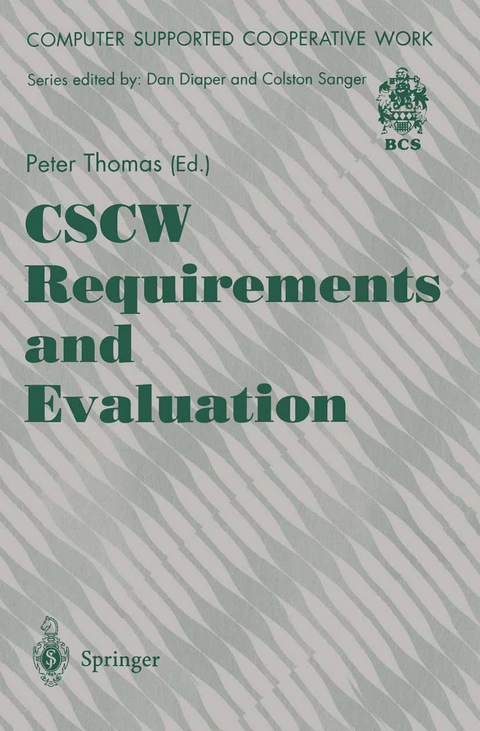
CSCW Requirements and Evaluation
Springer Berlin (Verlag)
978-3-540-19963-2 (ISBN)
1 Introduction.- 2 CSCW and Requirements Analysis: Requirements as Cooperation/Requirements for Cooperation.- 2.1 Introduction.- 2.2 Promoting Cooperation in Requirements.- 2.3 Cognitive Mapping.- 2.4 Empirical Results.- 2.5 Conclusion.- 3 "They're Supposed to be Fixing it": Requirements and System Redesign.- 3.1 Introduction.- 3.2 The "nth" Phase in the Requirements Process?.- 3.3 Considering Systems in Use.- 3.4 The Bank.- 3.5 Conclusion: "Requirements" and "Configuring the User".- 4 Cooperation, Requirements Analysis and CSCW.- 4.1 Introduction.- 4.2 Approaches to Requirements Analysis.- 4.3 Characteristics of Group Session Approaches.- 4.4 Research Issues.- 4.5 Prototype CRC Tools.- 4.6 Evaluation of the CRC Prototype.- 4.7 Research Issues for CSCW.- 5 User Requirements from a Group Perspective: The Case of Distance Learning Mediated by Computer Conferencing.- 5.1 Introduction.- 5.2 On Approaches to the Evaluation of CCS.- 5.3 Objectives of Case Study.- 5.4 Case Study: Distance Learning via Computer Conferencing.- 5.5 Examining the Social Organisation of the Students' Learning Activity in the CCS Environment, and the Problems they Encountered.- 5.6 Investigation of Participants' Communication Problems.- 5.7 Some General Implications.- 5.8 Summary of Other Findings.- 5.9 Recommendations and Further Development.- 5.10 Conclusions.- 6 Early Evaluation of the Organisational Implications of CSCW Systems.- 6.1 Organisational Impact.- 6.2 Approaches to Evaluation.- 6.3 The User Cost-Benefit Assessment Method.- 6.4 Evaluating the Impact of a Mobile Communications System.- 6.5 Reflections on the Use of the User Cost-Benefit Assessment Method.- 6.6 Conclusions.- 7 Coordination Breakdowns: How Flexible is Collaborative Work?.- 7.1 Introduction.- 7.2 EMailand Communication Problems.- 7.3 Definitions.- 7.4 The Role of Breakdowns.- 7.5 Discussion.- 7.6 Conclusions.- 8 The Why, How and What to Evaluate of Interaction Technology: A Review and Proposed Integration.- 8.1 Introduction.- 8.2 HOW to Evaluate: Methodology for Interaction Technology.- 8.3 Four Research Traditions.- 8.4 Choice of Evaluation Approach.- 8.5 WHAT to Evaluate: A Model of Distributed Social Interaction.- 8.6 Group Evolution.- 8.7 The Complete Evaluation Process.- 9 Measures of Process.- 9.1 Introduction.- 9.2 Common Ground, Effort and Social Salience.- 9.3 Surface Features of Conversational Content.- 9.4 Conversational Structure.- 9.5 Discussion.- 9.6 Conclusions.- 10 Dealing with Uncertainty - Perspectives on the Evaluation Process.- 10.1 Introduction.- 10.2 Evaluation in a Specific Context - Retail Financial Services.- 10.3 Conclusion - What is Evaluation?.- 11 The Use of Breakdown Analysis in Synchronous CSCW System Design.- 11.1 Introduction.- 11.2 Background.- 11.3 Usability Evaluation and CSCW.- 11.4 Breakdown Analysis.- 11.5 Conclusions.- References.- Name Index.
| Erscheint lt. Verlag | 1.12.1995 |
|---|---|
| Reihe/Serie | Computer Supported Cooperative Work |
| Zusatzinfo | XV, 192 p. 2 illus. |
| Verlagsort | London |
| Sprache | englisch |
| Maße | 155 x 235 mm |
| Gewicht | 340 g |
| Themenwelt | Informatik ► Software Entwicklung ► Requirements Engineering |
| Informatik ► Software Entwicklung ► User Interfaces (HCI) | |
| Informatik ► Theorie / Studium ► Künstliche Intelligenz / Robotik | |
| Mathematik / Informatik ► Mathematik ► Finanz- / Wirtschaftsmathematik | |
| Schlagworte | Calculus • Control • CSCW • Decision Making • Design • Evolution • Human-Computer Interaction (HCI) • interaction • learning • mapping • organization • Uncertainty • Usability |
| ISBN-10 | 3-540-19963-2 / 3540199632 |
| ISBN-13 | 978-3-540-19963-2 / 9783540199632 |
| Zustand | Neuware |
| Haben Sie eine Frage zum Produkt? |
aus dem Bereich


